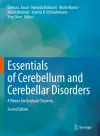
Essentials of Cerebellum and Cerebellar Disorders
6 contributors - Hardback
£129.99
Prof. Mario U. Manto is a professor of neuroanatomy at the University of Mons, Belgium. He is the head of the Department of Neurology at the CHU-Charleroi. He is the founding editor of The Cerebellum (Springer Nature). He has published more than 10 books. He is co-founder of the Society for Research on the Cerebellum and Ataxias. He has received research grants from national and international agencies (NIH, European Commission).
Donna L. Gruol PhD, is an associate professor in the Department Neuroscience at the Scripps Research Institute, La Jolla, California, and an adjunct associate professor in the Neuroscience Department at the University of California San Diego. She obtained a PhD in biology from the Illinois Institute of Technology and did post degree training in neuroscience at the University of Maryland Medical School, The National Institutes of Health, and The Salk Institute. Donna has been a member of several NIH grant review panels and has served on journal editorial boards and advisory committees. Her current research focuses on neuroimmune regulation of brain physiology and synaptic transmission and the role of the neuroimmune system in the actions of ethanol on the brain in preclinical models of alcohol use disorders.
Dr. Jeremy D. Schmahmann is a professor of neurology at Harvard Medical School and a senior clinical neurologist at the Massachusetts General Hospital where he is founding director of the Ataxia Center, director of the Laboratory for Neuroanatomy and Cerebellar Neurobiology, and a founding member of the Cognitive Behavioral Neurology Unit. Dr. Schmahmann received his medical degree with distinction from the University of Cape Town, completed residency in the Neurological Unit of the Boston City Hospital, and did his postdoctoral fellowship with Professor Deepak Pandya in the Department of Anatomy and Neurobiology at Boston University School of Medicine. He is a fellow of the American Academy of Neurology, American Neurological Association, and American Neuropsychiatric Association; a member of the Medical and Scientific Research Advisory Board of the National Ataxia Foundation and the Clinical Research Consortium for the Study of Cerebellar Ataxias; the executive committee member of the Society for Research on the Cerebellum and Ataxias; and past president of the American Neuropsychiatric Association. Dr. Schmahmann’s clinical and research efforts focus on the anatomical substrates of intellect and emotion, and the anatomy, clinical neurology and basic science of the ataxias, and other cerebellar disorders. He was awarded the Norman Geschwind Prize in 2000 by the American Academy of Neurology and the Behavioral Neurology Society for his description of the cerebellar cognitive affective syndrome and its neurobiological and theoretical underpinnings.
Dr. Noriyuki Koibuchi is a professor and director of integrative physiology at the Gunma University Graduate School of Medicine, Maebashi, Japan. Dr. Koibuchi obtained MD degree from Gunma University School of Medicine, followed by a PhD degree from the Institute of Endocrinology, Gunma University. He completed a postdoctoral research fellowship in neurobiology and behavior at the Rockefeller University. Following a tenure as an assistant/associate professor at the Dokkyo University School of Medicine, and as a visiting assistant professor at the Brigham and Women’s Hospital and Harvard Medical School, he took up his current position xxii About the Editors in 2001. He has been serving as a council member in several societies, such as the Physiological Society in Japan, the Japan Endocrine Society, and the Japan Thyroid Association. He is also serving as an associate editor in several journals such as The Cerebellum and Frontiers in Endocrinology.
Dr. Roy V. Sillitoe completed a PhD in neuroscience at the University of Calgary. He then received postdoctoral training at the University of Oxford, New York University, and Memorial Sloan-Kettering Cancer Center. He is currently an investigator at Baylor College of Medicine and the Jan and Dan Duncan Neurological Research Institute at Texas Children’s Hospital in Houston, Texas. Dr. Sillitoe is also the co-director of the Development, Disease Models & Therapeutics Graduate Program at Baylor College of Medicine. The focus of his research is to understand how the cerebellum contributes to different diseases. To accomplish these goals, his group uses mouse genetics, neuroanatomy, behavioral paradigms, and in vivo electrophysiology approaches. In addition, they are testing how deep brain stimulation (DBS) and exercise correct altered neural signals and rescue behavior in mouse models of ataxia, dystonia, tremor, and seizure disorders.